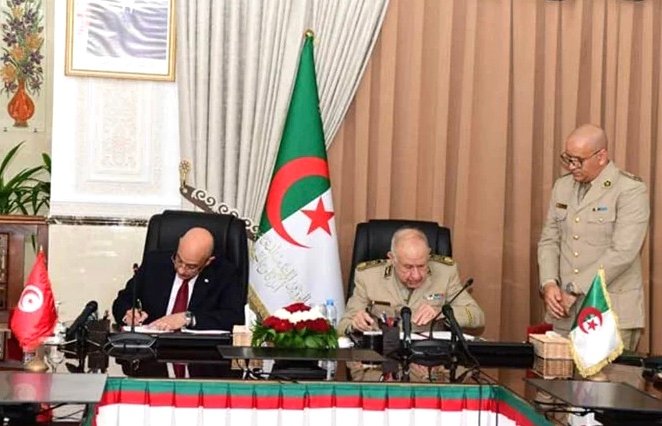Algeria and Tunisia have taken a major step toward deepening their security cooperation with the signing of a new intergovernmental military agreement, reflecting shifting power dynamics in the Maghreb.
The accord followed a meeting in Algiers between Algerian President Abdelmadjid Tebboune and Tunisia’s Defense Minister Khaled Sehili, who was accompanied by an official delegation. Also present was the Chief of Staff of the Algerian People’s National Army (ANP), General Saïd Chanegriha.
Officially described as a “strategic partnership,” the agreement has sparked debate among analysts about the growing imbalance in the relationship, with Algeria increasingly asserting dominance in regional security affairs.
 According to a government communiqué, discussions centered on coordinating efforts to combat cross-border threats and ensuring permanent consultation between the two countries. General Chanegriha highlighted the “exceptional nature” of Algerian-Tunisian relations and reiterated Algeria’s determination to strengthen cooperation across all defense sectors.
According to a government communiqué, discussions centered on coordinating efforts to combat cross-border threats and ensuring permanent consultation between the two countries. General Chanegriha highlighted the “exceptional nature” of Algerian-Tunisian relations and reiterated Algeria’s determination to strengthen cooperation across all defense sectors.
Minister Sehili praised Algeria’s “constant solidarity” but provided few details about the specific content or scope of the agreement.
While the terms remain undisclosed, the deal fits a broader pattern in which Algeria has expanded its influence over Tunisia through military equipment deliveries, intelligence sharing, and enhanced border security coordination. This growing alignment underscores Algeria’s dominant military role in the central Maghreb while increasing Tunisia’s reliance on its neighbor amid ongoing economic and institutional challenges.
Sehili’s visit comes as Tunisia seeks to diversify its foreign partnerships—particularly with Italy and the United States—to reduce its strategic dependence. Yet, the deepening ties with Algiers may limit Tunisia’s room for maneuver, especially on regional security issues where Algeria increasingly sets the agenda.
By showcasing closer military collaboration with Tunis, Algiers appears intent on consolidating a Maghreb-wide security axis under its leadership. The move also sends a clear signal to regional actors, including Morocco and France, that Algeria remains the preeminent military power in North Africa.
For Tunisia, however, the rapprochement appears driven less by strategic choice than by necessity, as the country struggles with mounting economic pressures and growing diplomatic isolation.
Source:Africa Publicity








